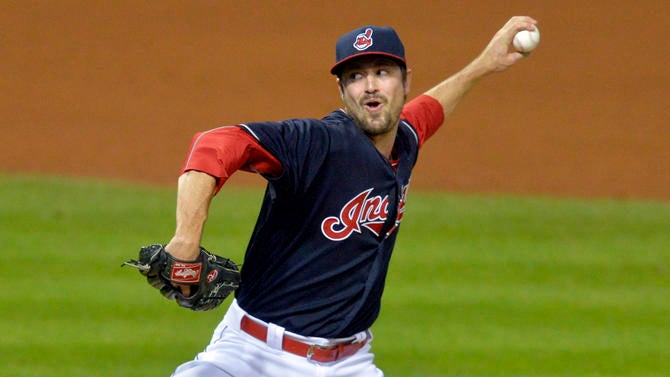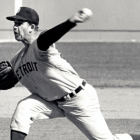The Indians are kicking the closer-save mentality to the curb with Andrew Miller
Hats off to Francona for using Miller as a fireman

Years ago, the best relievers were used in the game's most difficult spots, sometimes in multiple innings. Along the way, the save stat was invented and then we eventually evolved to the point that the "closer" was a specialization that lasted only one inning for the most part. Sure, sometimes the closers would work four-out saves or even five outs or two innings. More often than not, however, the closer works the ninth inning. More recently, we've even seen a movement of having an "eighth-inning guy" and even a "seventh-inning guy."
As such, when the Indians acquired stud lefty Andrew Miller from the Yankees, many believed he would become the closer with incumbent closer Cody Allen moving to the eighth inning.
Sure enough, the first close game Miller pitched for the Indians was a save on Aug. 6 (in Yankee Stadium, for a fun twist).
Since then, however, Miller has zero saves in four outings. He wasn't demoted from the closer role. Quite the contrary, Indians manager Terry Francona already foresaw varying up the usage of his relievers. From back on July 31, this is what Francona said about adding Miller to the fray (cleveland.com):
"In Andrew Miller we are getting one of the very elite relievers in all of baseball," said Francona. "You can even take it a step farther because we have guys at the end of the game that are interchangeable not only in their willingness (to pitch in different roles), but in arm actions.
"We're going to have a chance to leverage guys and believe me we will."
He wasn't lying.
On Aug. 9, Miller took over in the seventh with a two-run lead and got four outs. He gave up a solo homer, but the Indians still won while Allen recorded the save while avoiding the meat of the Nationals order.
I have no doubt that, in a vacuum, the "final three outs are the hardest" rings true to major-league relievers. Most of them say as much. Every game isn't played in a vacuum, though.
On Aug. 13, Miller pitched the eighth inning in a 5-1 Indians win, but that was the inning with Kole Calhoun and Mike Trout batting while Allen got the save after retiring Andrelton Simmons, Jefry Marte and Jett Bandy.

The following night, Miller took over with a one-run lead and retired all six batters he faced, slicing through the difficult portion of the Angels' order and leaving Gregorio Petit, Jett Bandy and Ji-Man Choi for Allen in the ninth.
See how silly the "final three outs are the hardest" mantra seems in situations like that? It shouldn't be applied to every single game, regardless of the specific circumstances. It's a generality. Francona knows Miller is his best reliever, but he doesn't save him for the ... um ... save every time. A stat isn't dictating his usage. His brain is. What a novel concept.
Aug. 16 was similar. Miller came in with a one-run lead in the seventh against the White Sox and got six outs, the final three being Melky Cabrera, Jose Abreu and Justin Morneau of the White Sox. Allen had to deal with Todd Frazier in the ninth, sure, but it was to lead-off the ninth and by then the Indians had a two-run lead. Miller did the heavy lifting and Allen got the save.
Now, the following night, Miller wasn't available and Allen blew the save on an Adam Eaton grand slam. Francona took the blame afterward, saying he'd overworked Allen.
Is one blown save really that huge a deal anyway, though, in the grand scheme of things? Allen had just put together six scoreless outings before that one. It was the first time he allowed multiple runs in a game since April 21, a span of 44 appearances with a 1.41 ERA.
And just because Miller is better than Allen, that doesn't mean Allen is a slouch. He's a good closer. He's just not as valuable as Miller. That shouldn't be construed as an insult, either.
This isn't a new concept. Our R.J. Anderson discussed the Rays using the old-school "fireman" model with Erasmo Ramirez earlier this year and, as mentioned, it happened for decades before the specialized version of the closer was born.
It would be nice to see managers begin to move back toward this concept. It's unbelievably frustrating to watch a game blown in the seventh or eighth inning while a stud reliever watches on from the bullpen because he's been designated the "closer" -- especially if the bottom part of the order is due up in the ninth.
I understand some relievers like to have set roles and, yes, they are human beings. So maybe making them move around would cause an issue with performance. The middle relievers can adapt, though, so why can't the more talented pitchers? No one could ever convince me that it's better baseball to manage to a stat instead of using your best players to combat their best players. Why use a string of lesser relievers to sweat through the seventh and eighth only to have the closer get the 7-9 spots in the order with a two-run lead?
Now, this isn't only the manager. We already know some relievers would be angry if they weren't the closer. We already heard that Aroldis Chapman doesn't like four-out saves, for example. So maybe it'll take some time and unraveling of mindsets to get this thing back to where many believe (myself included) it needs to be.
Having said that, let's give credit to both Francona for how he's using Miller and to Miller for being willing to do whatever is best for the team.

















